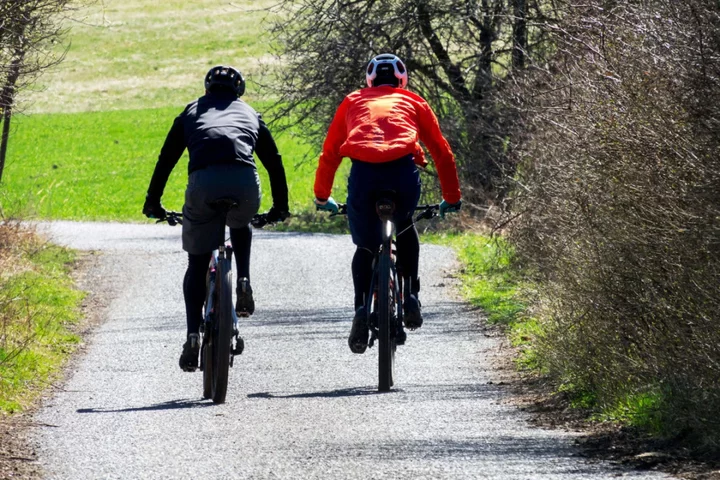
Men who cycle, jog or swim could cut risk of nine cancers – study
Male joggers, swimmers and cyclists could be cutting their risk of nine cancers, a new study suggests. Researchers found that men with good cardiorespiratory fitness are far less likely to go on to develop cancers of the head and neck, stomach, pancreas, liver, bowel, rectum, kidney, lung and oesophagus. Cardiorespiratory fitness refers to a person’s ability to do aerobic exercise, such as running, cycling and swimming for sustained periods, or even to climb stairs. The new study, published in the British Journal of Sports Medicine, saw experts from Sweden track just over a million men for an average of 33 years. The men involved in the study were conscripted to military service in Sweden between 1968 and 2005. At the start of their conscription the men underwent a battery of tests assessing a number of factors including their height, weight, blood pressure, muscle strength and cardiorespiratory fitness. During the follow-up period, about 84,000 developed cancer. Researchers found that, compared with those with low cardiorespiratory fitness, men with a higher level of cardiorespiratory fitness were: – 19% less likely to develop head and neck cancer.– 39% less likely to develop cancer of the oesophagus (food pipe).– 21% less likely to develop stomach cancer.– 40% less likely to have liver cancer.– 18% less likely to develop bowel cancer and 5% less likely to develop cancer of the rectum– 20% less likely to develop kidney cancer.– 42% less likely to develop lung cancer.– 12% less likely to develop pancreatic cancer. “These results could be used in public health policymaking, further strengthening the incentive for promoting interventions aimed at increasing [cardiorespiratory fitness] in youth,” the authors wrote. The researchers did find that higher cardiorespiratory fitness was linked to a slight (7%) increased risk of prostate cancer and a 31% increased risk of skin cancer. A previous study examining the same data set suggested the slight increase in risk for prostate cancer was not linked to a higher rate of aggressive prostate cancer or prostate cancer death, and could be attributable to increased screening. The authors suggested a higher skin cancer rate could be explained due to “higher UV exposure”. Read More Charity boss speaks out over ‘traumatic’ encounter with royal aide Ukraine war’s heaviest fight rages in east - follow live Why are wellbeing experts concerned about TikTok’s ‘lazy girl job’ trend? Red flags you might be missing about your child’s online safety Rumer Willis says she is ‘grateful’ to her body following birth of daughter
2023-08-16 16:57
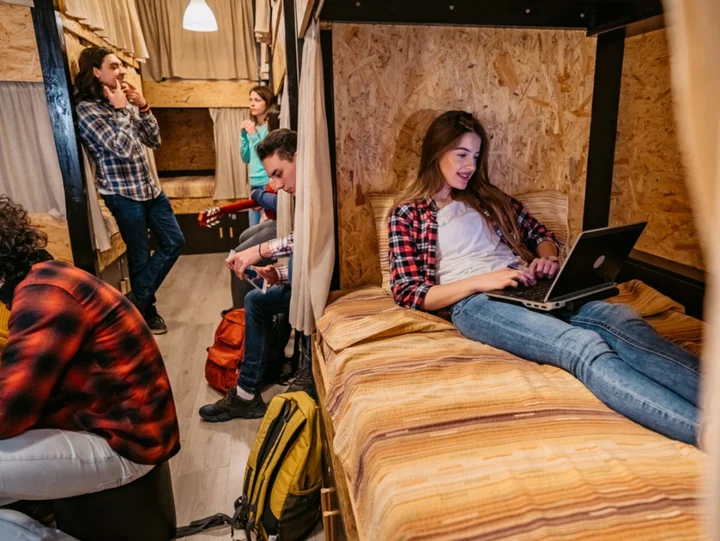
Why hostels are having a renaissance amid the cost of living crisis
It doesn’t matter how many times an influencer tells you that “courage” is the only thing required to travel – it doesn’t change the fact that you normally need cold, hard cash. Airlines and hotels don’t care about our personal motivations and bucket lists, and travelling is – now more than ever – a luxury. At a time when food banks are bursting at the seams, millions of people have placed travelling in the “maybe next year” category. I’m one of them – I simply can’t afford to go abroad right now. Even a trip to visit my parents in my native Poland must wait till autumn, when Ryanair tickets fall low enough to be within my price range. At the same time, I firmly believe that summer is for fun and making memories. So, one morning in June, I decided to take a day trip from Glasgow to Pitlochry in the Scottish Highlands. I initially planned on using a return ticket, returing home the same evening to cut costs. Then I saw a backpackers’ hostel on the town’s picturesque high street. I couldn’t resist. I had to check-in. Read more on Scotland travel: Take the train for a sustainable Scottish Highlands adventure Best budget hotels in Scotland The best Scotland road trips to travel in your lifetime What comes to mind when you read the word “hostel”? Temporary accommodation for people with no luck? Prison-like conditions? A horror film from 2005? In my case, the answer is community. At the age of 18, I began working in the funky and vibrant hostels of Krakow’s Jewish Quarter. What initially started as a way to escape hellish call-centre work quickly turned into the most fulfilling job I ever had. As a result, my nostalgia-fuelled stay at Pitlochry Backpackers felt magical yet surreal. The pandemic nearly destroyed the industry. Sleeping in one room with multiple strangers simply wasn’t an option at a time when most people were meeting their friends and loved ones in parks for socially distanced walks. Even the award-winning hostels I used to work in didn’t survive, and they were among the best in the world. Hostels aren’t just about a cheap bed; if you choose wisely, yours might be more fun than any fancy hotel. And trust me – I love fancy! But it’s a chance to meet new friends from all over the world, or at least encounter characters you’re unlikely to spot at the local branch of Hilton. The hostels I worked in had a tremendous reputation because the whole team worked hard to provide an unforgettable experience. We showed our guests around the city, partied with them, cooked for them at no extra charge, played games and booked tours together. I’m still in touch with some of my former guests, many of whom I met way back when people on the internet were arguing about the colour of a dress. Nearly a decade later, most of us are scarred after a deadly pandemic and much poorer than we wanted to be. If ever there was a time for a hostel renaissance, it’s now. Hostels aren’t just about a cheap bed; if you choose wisely, yours might be more fun than any fancy hotel I think everyone with a passion for travel should try a proper hostel at least once in their life. There is something harmonious about exploring a new place – whether it’s a Highland forest or the Old Town in Prague – and returning to a communal space filled with personality, where the sound of laughter welcomes you as soon as you cross the threshold. In Pitlochry, I spent the day spotting kingfishers in the forest and listening to Joni Mitchell by the Loch Dunmore. Upon my return, I was greeted by a cheery Australian lad who said we should go for pints later. In the hostel’s kitchen, people were making a casserole together. I ended up solving jigsaw puzzles with two Brazilians at 2am while discussing the Arctic Monkeys and Harry Styles’ newest album. In the digital era, and in the midst of a loneliness epidemic, it’s harder than ever to establish new connections face-to-face. Even asking for a napkin at McDonald’s gives me anxiety. That night in Pitlochry, I was showered with generosity and kindness. Chatting to everyone and learning about their circumstances felt liberating and natural. The process of choosing a hostel is not much different to picking a hotel. Pay attention to reviews; a place with a good rating is likely to be perfectly clean and tidy. A caring management is key. Ideally, you want your hostel to include various references to backpacking and the outdoors. Speaking from experience, if the place is filled with maps, flags, and leaflets, that’s a good start. A hostel should be a warm, authentic place that brings together people who are passionate about visiting new places and learning new things during their adventures. There’s nothing worse than a cold, lifeless hostel with white walls and fragile, aluminium frame beds that squeak and shake every time you take a deep breath. Many hostels offer private bedrooms at prices much lower than budget hotels. Booking one is a best-of-both option for those who would love to experience the social elements of a hostel without having to share a dorm with strangers. If you’re staying in a dorm and the place isn’t fully booked, they will most likely offer to move you to the most comfortable dormitory or bed available. Receptionists are there to tell you about the area, offer recommendations and help you book attractions. In the digital era, and in the midst of a loneliness epidemic, it’s harder than ever to establish new connections face-to-face Pitlochry is a popular Scottish tourist destination, but my stay still cost me a paltry £25. Book a good hostel in Central or Eastern Europe, and you could end up paying half that price. On the other end of the spectrum, some of Europe’s best hostels, such as Majdas Hostel in Mostar, Bosnia and Herzegovina, or the House of Sandeman in Porto, Portugal, charge somewhere between £30 and £45 for a night in a dorm during the summer months. That’s still far cheaper than most hotels, for digs that are arguably far superior. Pitlochry Backpackers helped me find a bit of that 2010s joy in me again. Surrounded by board games, DVDs, musical instruments, and quirky posters reminded me that you don’t have to splurge to have memorable, delight-inducing travel experiences. I might be cash-poor, but I now intend on getting out and exploring more of Britain’s nature while staying in cheap and cheerful backpackers’ hostels. I don’t plan on staying home all summer, and you don’t have to either. It’s time to shake off your British reserve, channel your inner extrovert and swap buttoned-up luxury for the hotel’s more affordable, cooler cousin. Read more of our best Scotland hotel reviews
2023-08-16 16:46
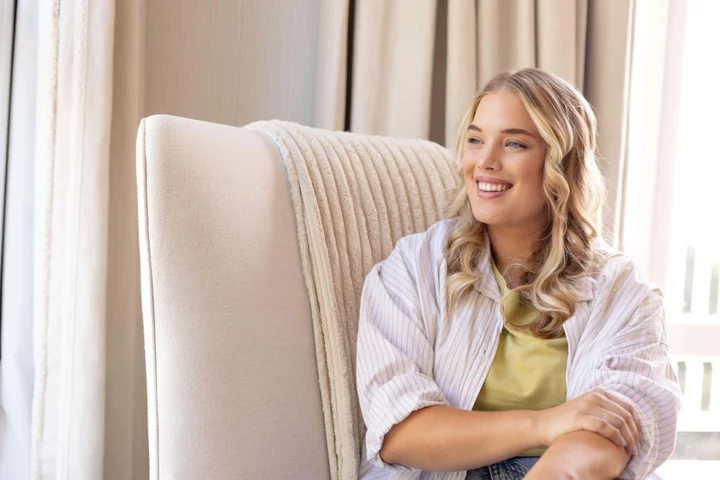
Why are wellbeing experts concerned about TikTok’s ‘lazy girl job’ trend?
Have you clocked TikTok’s ‘lazy girl job’ trend? It’s all about prioritising work-life balance over a job that drains you dry. A ‘lazy girl job’ is one that pays well enough for you to live comfortably – but doesn’t need to define your entire self-worth and consume too much of your time and energy. On the surface, this all sounds quite healthy, a backlash to the always-on ‘hustle culture’ that’s become ingrained in the modern world. So, why are wellbeing experts concerned? Work-life balance isn’t lazy “Turning your back on hustle culture shouldn’t be deemed ‘lazy’,” Tina Woods, CEO of Business for Health, a business-led coalition focused on improving workforce health, told PA Media. “A healthy work-life balance should be encouraged, rather than shamed, and employees shouldn’t feel guilty or ashamed for prioritising their wellbeing and mental health over their work duties and workload.” So, it’s not so much the concept behind ‘lazy girl jobs’ that’s problematic. Rather, it’s the use of the word ‘lazy’ to describe somebody who works a reasonable number of hours and values their wellbeing, and the reasons we got to this point in the first place. Have we normalised overworking? There may be times when people need or choose to hustle, or devote a larger chunk of their time towards a particular goal. That’s not something we need to sweepingly demonise necessarily. “Just as we shouldn’t shame employees who do set boundaries in the workplace and [want] a healthy work-life balance, there will be some employees who enjoy ‘hustle culture’,” Woods added. “Ultimately, employees should have the choice and flexibility to work how they choose to.” What isn’t good though is how “overworking” has become “expected” as part of modern working culture, she explained. We’re seeing a growing culture of overworking being celebrated... Tina Woods, Business for Health CEO “Hustle culture has grown in popularity since the pandemic, with side hustles on the rise amongst employees, especially Gen Z. However, the notion of pushing yourself and putting your all into your work can cause both physical and mental effects. It can lead to a toxic working pattern and trigger stress and burnout, as well as physical ailments such as disrupted sleep patterns and exhaustion,” said Woods. “More often, we’re seeing a growing culture of overworking being celebrated and, in many situations, expected. Whether this presents itself through staying at the office late, or not taking a lunch break or annual leave, working tirelessly is being rewarded by some seniors, and it shouldn’t become the norm.” What does this mean for young women? The fact the trend has been centred on ‘girls’ is another point of consideration. “Traditionally, women and especially mothers have faced stigma in the workplace. This includes stigma around personality traits, maternity leave and women’s health. As a result, many female employees will feel the need to push themselves harder or work longer hours than their male peers,” said Woods. “Women and parents are more likely to report lower mental health, putting them more at risk for mental health conditions such as anxiety and depression. This, coupled with the pressure women may already feel at work and stigma, such as the latest ‘lazy girl job’ trend, means employers need to ensure they’re creating a supportive work culture and healthy environment.” Culture shift According to Woods, there is a responsibility for employers to drive cultural shifts towards a healthier approach to work with a focus on preventative measures, rather than waiting until employees are encountering problems such as burnout or chronic stress, and then responding. “Setting boundaries that lead to a healthy work-life balance is something that should be encouraged in the workplace. It’s clear that post-pandemic, the boundaries have become blurred, with many adapting to hybrid and remote working. However, this is an issue employers need to make a priority,” said Woods. “By doing so, workplaces will see higher levels of presenteeism, alongside boosted morale, engagement and productivity. In a tight labour market, attracting and retaining employees is also vital. Wellbeing plays a big role in that. “Policies such as ‘Permission to Pause’ can be really powerful in encouraging a healthy work-life balance. They give employees autonomy and the ability to stop and take some time for their wellbeing within the working day, without feeling guilty,” she added. “Perhaps, most importantly of all, employers need to listen and respond to the needs of their own workforce and sector, recognising there is no ‘one size fits all’ solution to health and wellbeing, because everyone is uniquely human. Business leaders, HR managers and line managers can work to better understand the needs of their workforce through pulse surveys, interviews, and open forums.” Read More Charity boss speaks out over ‘traumatic’ encounter with royal aide Ukraine war’s heaviest fight rages in east - follow live Red flags you might be missing about your child’s online safety Rumer Willis says she is ‘grateful’ to her body following birth of daughter Sugary cereals and yoghurts must remove child-friendly packaging – health group
2023-08-16 16:26

Carlsberg Profit Shows Drinkers Willing to Swill Pricier Beers
Carlsberg A/S reported better-than-expected half-year profit after consumers shelled out more money for premium beers even after unprecedented
2023-08-16 14:46
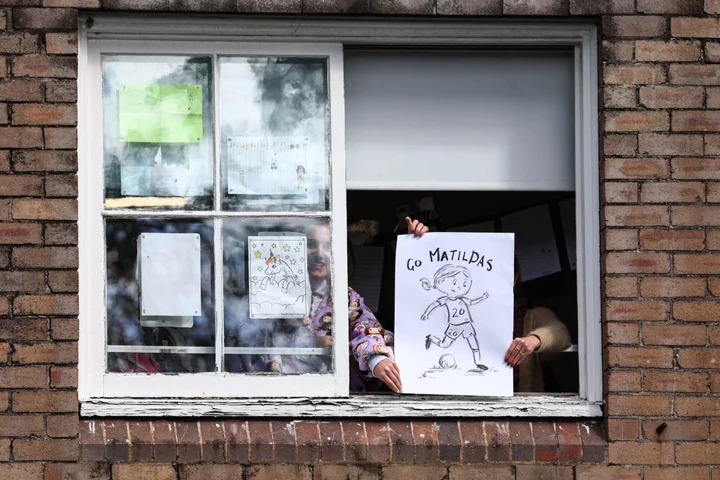
Australia Rallies Behind Matildas for Crunch World Cup Match
Australia reached fever pitch ahead of its national team’s first appearance in a Women’s World Cup semi-final match,
2023-08-16 10:52

House explosion outside Pittsburgh leaves 5 dead, 3 injured, officials say
An explosion in a residential suburb outside Pittsburgh on Saturday morning left five people dead -- including a father and son -- and three others injured.
2023-08-16 10:19
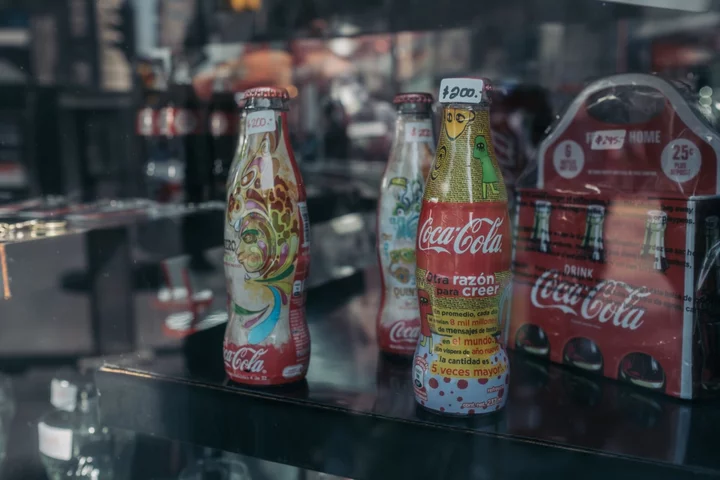
Warburg, Kelso Make Bid for Femsa’s $5 Billion Envoy Unit
Mexican Coca-Cola bottler Femsa is in talks to sell a US packaging and food services business to private
2023-08-16 09:19

Jessica Simpson reacts to Catherine Zeta-Jones wearing dress she wore 17 years ago
Catherine Zeta-Jones was spotted out in Portofino, Italy, hand-in-hand with her husband, Michael Douglas, wearing an ethereal, deep purple Emmanuel Ungaro gown. However, eagle-eyed fans noticed that pop star Jessica Simpson wore the exact same dress to VH1’s Big in ‘05 awards show, where coincidentally she was awarded for her sense of style. Although Zeta-Jones, 53, wore the dress in July, Simpson recently reacted to the actor’s glamourous look, saying on her Instagram Story: “Sexy never goes out of style.” It certainly wasn’t the first time two celebrities had a twinning moment. In the height of the ‘00s magazine era, outlets famously printed both photos of stars wearing the same outfit alongside the question: “Who wore it better?” While tabloids often pitted two women against each other, it was a sign of the times that Simpson supported and complimented the Oscar winner’s look. Glamour posted a side-by-side picture of both Simpson and Zeta-Jones’ looks to Instagram, sans comparison. Many users in the comments section were divided by the early aughts style of the dress. One commented that the dress looked “like a Gucci number,” while another wrote: “Could have stayed in 2005.” When Simpson originally wore the gown, she had recently finalised her divorce from Love Is Blind host Nick Lachey. According to Us Weekly, fans considered the sultry look a “revenge dress” back in the day. Since then, Simpson has become a mother of three and recently authored the best-selling memoir, Open Book, which has sold half a million copies worldwide. In the book, Simpson confided in readers about her struggles with alcoholism, weight loss, and relationships in the public eye. The singer also spoke about her eponymous fashion line, which includes apparel, shoes, hair extensions, and at one point, edible body products. Like Simpson, the Chicago star has also turned heads with her fashion looks. These days, she does so alongside her daughter - rising musician Carys Douglas, who goes by CZD professionally. The mother-daughter pair recently donned Elie Saab gowns to the Jeanne Du Barry premiere at the 76th annual Cannes Film Festival. While Zeta-Jones wore a deep, plunging red gown with a matching cape attached to one sleeve, all eyes were on her mini-me. For her red carpet debut, her daughter wore a gown made of a sheer lace fabric, coupled with netting detail near the hem of the skirt. She paired the look with a soft, rosy-cheeked makeup look that emphasised her youthful ensemble. Beside her mother, the budding singer watched as her father was awarded with the Lifetime Achievement Palme D’Or. She took to Instagram to post about the glamourous evening, writing: “Thank you Cannes for the most wonderful evening! It was an honor to celebrate my father as he received his lifetime achievement Palm D’Or. Bon festival!” Read More Jessica Simpson has subtle response to claims ex-husband Nick Lachey was ‘villain’ in their relationship Catherine Zeta-Jones compares daughter Carys to Wednesday Addams in throwback post Pharrell Williams designed his first collection for Louis Vuitton for himself TikToker urges parents to save all their old clothes for children to inherit Billy Porter criticised for calling Anna Wintour a ‘b****’ over Harry Styles cover
2023-08-16 06:23

Parents of nine-year-old high school graduate reveal their number one parenting tip
David Balogun is a normal kid who competes in paper airplane races with his younger sister, Eliana and struggles to sit still, but he is also one of the youngest people in the United States to receive a high school diploma. In late January, Balogun graduated from Reach Cyber Charter School, which is a tuition-free online school in Pennsylvania. This month he will be starting classes at Southern New Hampshire University as a full-time student. Balogun and his parents, Ronya and Henry, spoke about what it was, and still is, like raising someone with a high intellect on CNBC Make It. The couple said they first tested their son’s intelligence when he was six years old. After that, they began to rethink any parenting philosophies they previously had. “There’s no book on it,” Ronya said. “You’ve got to develop a different mindset as a parent,” Henry added. “It’s not always easy when your son is asking you questions constantly. You have to keep answering the questions, because you don’t want to say, ‘Just leave me alone.’” Because of David’s unique circumstances, they’ve developed their own number one rule: When a system isn’t built for your child, don’t try to fix your child. Try to fix the system. Ronya said when David was in first grade, a regular classroom wasn’t working anymore, noting that sometimes his peers would listen to him more than the teacher. So they looked into their state’s gifted programs, which also proved to not be rigorous enough for their nine year old. In 2020, his parents enrolled him in Reach which allowed him to individualise his curriculum and take high school level classes. Although that didn’t come without challenges, including multiple calls to The College Board because David’s birthdate was too young to enroll in advanced placement exams. As for deciding on college, Ronya said she had to put her foot down mentioning she didn’t want David in a class filled with 20 year olds. “It’s a different adaptation that we don’t have in the United States of America yet. It’s very scary, you can’t find this,” she said. “Sometimes I can’t fix the system, but there are other unconventional choices and solutions to help lead my son through his journey to fulfill his dreams.” Trust is also a big part in parenting David, his parents said. They mentioned that, when he was learning specific skills like adding and subtracting negative numbers before he was taught, they had to believe he knew how. “I can’t tell him, ‘This is what you know,’ because I’m not in his brain,” Ronya said. “I have to trust him to be partially leading the way.” Although there are some boundaries in this trust, as David came home one day claiming he now knew where babies came from. His mother was able to briefly give him some information on reproductive anatomy before putting the conversation to a stop. “Mind you, at this moment, I’m talking to a six year old,” Ronya said. In terms of what happens to David beyond college, his parents are unsure and are just figuring it out as they go along. “There is no frame of reference,” Ronya said. “So you know how sometimes when there is no path, you start a new path? Yep, that’s what we’re doing.” The Independent has contacted Ronya and Henry for comment. Read More TikToker urges parents to save old clothes for their children after inheriting mother’s wardrobe Mother criticises ‘double standard’ after husband is praised for taking toddlers to grocery store Mother sparks viral debate for ‘shaming’ parent who refused to give her daughter a slice of cake TikToker urges parents to save all their old clothes for children to inherit Gen X mother goes viral for attack on ‘tired’ American Dream Couple discovers why their child thought ‘mums foam at the mouth while having babies’
2023-08-16 05:55

China’s Top Brands Turn Cautious Over Economic Recovery
From beauty products to beverage makers, some of China’s top brands are turning cautious on the world’s second-biggest
2023-08-16 05:16
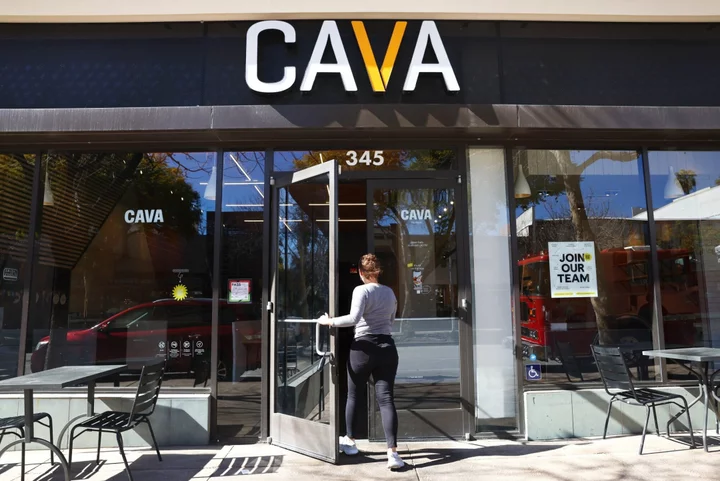
Restaurant Chain Cava Projects Profit Growth in First Update Since June IPO
Cava Group Inc. expects higher profits this year, although it cautioned that a muddy consumer-spending picture could limit
2023-08-16 04:59
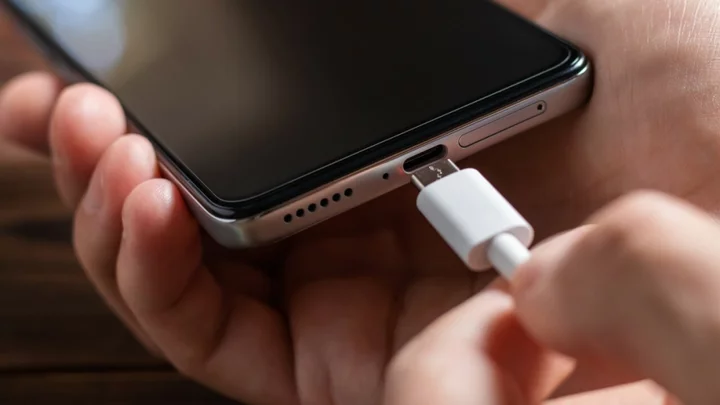
How Long Will It Take to Charge Your iPhone? Use This Shortcut to Find Out
Despite the fact that Apple no longer ships its smartphones with power adapters, charging your
2023-08-16 04:58
